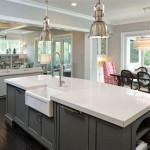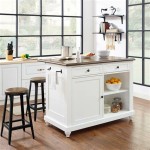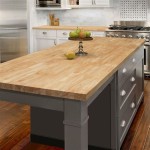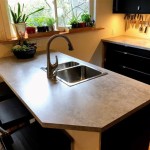Is Granite Good for Kitchen Countertops?
Granite is a popular choice for kitchen countertops, and for good reason. It is a durable, beautiful, and natural stone that can elevate the aesthetic of any kitchen. This article explores the advantages and disadvantages of granite countertops, helping you make an informed decision about whether it is the right material for your kitchen.
Durability and Resistance
One of the most significant benefits of granite is its exceptional durability. It is a naturally hard and dense stone, making it highly resistant to scratches, heat, and stains. Granite countertops can withstand the daily wear and tear of a busy kitchen, including the impact of heavy pots and pans. This durability translates into long-lasting beauty and functionality, making granite a smart investment for homeowners seeking countertops that will remain in good condition for years to come.
Granite's resistance to heat is another notable advantage. It can tolerate the placement of hot pots and pans directly on its surface without damage. This feature eliminates the need for trivets or hot pads, simplifying kitchen tasks and maintaining the integrity of the countertop. However, it is important to note that while granite is heat-resistant, it is not heatproof. Extreme temperature changes can cause cracking or chipping.
Aesthetic Appeal and Versatility
Granite’s natural beauty and variety of patterns and colors make it a highly sought-after countertop material. Each slab of granite is unique, exhibiting distinctive veining, swirls, and color variations. This natural beauty adds character and depth to any kitchen design.
The wide range of colors and patterns available in granite allows for customization and personalization. Whether you prefer a classic white and gray scheme or a bold, dramatic black and gold design, there is a granite option to complement any kitchen style. This versatility ensures that you can find the perfect granite slab to match your individual aesthetic preferences and create a cohesive look for your kitchen.
Maintenance and Considerations
While granite is a durable material, it does require some maintenance to preserve its beauty and functionality. Regular sealing is essential to prevent staining. Granite is a porous stone, and without proper sealing, liquids can penetrate the surface and leave permanent stains.
The sealing process involves applying a sealant to the countertop surface, creating a protective barrier that repels liquids and stains. Sealing should be repeated periodically, typically every one to two years, depending on the level of use and the type of sealant used. While sealing may seem like an additional chore, it is a crucial step to maintain the pristine appearance of your granite countertops.
Another consideration when choosing granite is its cost. Granite is typically more expensive than other countertop materials like laminate or engineered stone. However, it's important to consider the long-term value and durability of granite. Its longevity and potential to increase the value of your home can make it a worthwhile investment.

Quartzite Vs Granite The Good And Bad Zstone Creations

Pros Cons Of Granite Factors You Should Consider

The Pros And Cons Of Granite Countertops In Kitchen

Granite Counter Tops For Your Kitchen Naveentile

Top 15 Solid Kitchen Granite Countertop Colors For 2025

Pros Cons Of Granite Factors You Should Consider

Important Benefits Of Granite Countertops Mpg Stone

The Ultimate Guide To Choosing Granite Kitchen Countertops In Philadelphia Pa

9 Granite Kitchen Countertop Ideas Euromarble

White Granite Countertops 10 Popular On Trend Colors To Consider Lx Hausys
See Also








